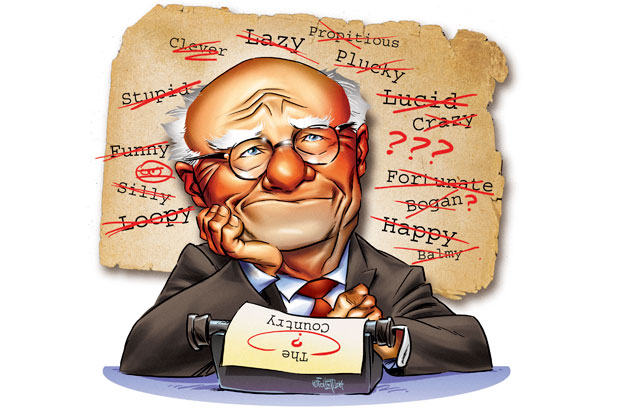Back in the days when Young Donald was the life of the party, well before he became a National Sage and at times a Public Bore, one of his lively party turns was a variation of the game of charades. We would all be given roles to act out but he was by far the funniest. He would brilliantly ham up the Leftie Journalist, the Labor Grouper, the Liberal Windbag, the Domain Orator, the University Freethinker, the Street-Corner Wowser, Footnote Fanny or whatever. He had the house in fits.
It was this Donald Horne that sprang to mind when I sat down, fifty years ago, to write my review of The Lucky Country (price 8s. 6d) for the Bulletin. This is how my first paragraph began:
There are many Donald Hornes in this engrossing new book. There is Horne the Prophet of Doom and Horne the Man of Confidence, Horne the Puritanical Censor and Horne the Hedonistic Pagan, Horne the Tub-Thumper and Horne the Poet of the People.
What holds them together, I wrote, is Horne’s sense of an impending national catastrophe, of the growing threat to our survival as an independent country – and our rooted indifference to this or any other threat. This was the time when other prophets such as Malcolm Muggeridge were giving Australia another fifteen years at the most before it disappeared from history, blown away by some mighty emerging power such as Red China. What Australians desperately need, Horne said, are some ‘sudden shocks of reorientation’. For a start we must scrap White Australia and abolish the Monarchy. Then we must toss out all the second-raters – ‘the racketeers of the mediocre’- who still run the country.
Many of Horne’s critics believed that in getting stuck into Australia’s dominant second-raters he was basically expressing rage at his rivals who had master-minded his humiliating dismissal as editor of the Bulletin and the decision that he concentrate in future on editing a trashy entertainment weekly. (In those days he sometimes seemed to have more enemies than admirers. That is the price, he would say, which independent spirits must pay for rejecting the national mediocrity.) But there was far more to it than simple pique. Hurt and exhausted in the service of the Packer press, he now resigned, joined an advertising agency (or went into exile, as he put it), and began to write his apologia, his reflections on his life and times. Born of this complex and life-changing disenchantment, The Lucky Country is by far his best book.
It immediately struck a chord with the public. Its timing was excellent. It quickly became a best-seller. Its success and fame changed Horne’s life. He now became ‘a writer’, no longer a mere journalist or copywriter. Repositioning himself somewhere on the left, he was now able to overcome any lingering reputation as a ‘Packer stooge’ (‘I’ve always been a boss’s man,’ he liked to announce provocatively) and a sycophant of Brian Penton, Packer’s brilliant if now forgotten editor of the Daily Telegraph, scourge of the Labor Party, and punchy pamphleteer (Think- Or Be Damned!; Advance Australia –Where?). The poet Amy Witting, Labor-leaning in politics, misjudged this earlier Horne but caught something of his reputation in her mordant doggerel:
Who kissed Penton’s arse?
I said the Horne!
For this I was born.
I’m top of my class.
But Horne was no sycophant, although in Penton he had found a radical conservative role model.
There was no doubting his former Toryism. Even as late as 1959, when the Tories easily won the British election, I recall an irritated Horne ruminating: ‘If I had not come back to Australia, I would be a Tory MP in the House of Commons now.’ (He would have enjoyed Prime Minister Macmillan’s ‘winds of change’ and his ‘night of the long knives’. Not so sure about the Notting Hill riots.) But with the Lucky Country of 1964 all that ended. He now became a herald of Whitlamism, a sort of John the Baptist to the emerging Messiah. He caught both the promise and the humbug of the new creed.
‘Everywhere one goes in Australia,’ he wrote, ‘among sensitive intelligent people of the middle generation – once the conversation reaches a certain depth – one meets a sense of desperation. There is a feeling of distrust; a fear that responsible, clever people will just not be found; that there will be no breakthrough of the new men.’ Well, the New Men, the clever chaps, easily broke through. Waving copies of The Lucky Country they gave us three throbbing years of Whitlam government followed by several decades of Whitlamite quangos, commissions, and agencies. They’re still hanging on, to this day. Horne’s New Men had seized power and set out to correct the old easy-going Australia and remould it in their image. David Williamson’s plays, especially Don’s Party in 1971 and The Great Man in 2000, dramatise the underside of the narrative.
But the potency of The Lucky Country is by no means only its role as a manifesto of a new age. It had a more enduring appeal. Horne gave his polemic a wonderfully catchy title. He wrote it in crisp engaging prose. He scattered throughout the text his sharp insights into Australian life. Here are a couple of examples. (Note the engaging autobiographical touches.) The first is on the limitations of Australian creative ratbaggery:
Themselves calculating, materialist and optimistic, Australians find it hard to accept that quixotry, pessimism, spirituality, desire for defeat, love of rhetoric or of risk, of wielding power for its own sake – all ratbaggery these – may often impel action. In the narrow shaft of clear, bright sunlight, where Australians think, there is little room for the view in which we all just seem to bump around in the shadows with little understanding of what it is all about. Australians think they have life taped.
Here he is on the limitations of mateship:
Most Australians are bereft of feelings of difference; they think that all people are the same, that what is good for oneself is good for anyone else. Their openness and friendship-seeking is based on this belief. They seek similarity where often it does not exist. They reach out for the essential humanity of man but the apparatus with which they do it is too primitive for the task. They retreat into suspicions.
And on the Typical Australian circa 1964 :
The image of Australia is of a man in an open-necked shirt solemnly enjoying an ice-cream. His kiddy is beside him.
In my review of the book in 1964, I did not accept Horne’s big idea that we owe our success as a country more to luck than to sweat, drive and imagination. Yet this is the theme that made the book’s reputation throughout its many editions. The coherence of it all is more a matter of style than of reasoning. Geoffrey Blainey compared Horne as a writer to a dashing bee, always pollinating, occasionally stinging, and then cheerfully buzzing off to new fields. It is his highly strung and sensitive personality as expressed in his lively, imaginative and buttonholing prose rather than the weight of argument that wins us over.
Donald Horne was the first editor I ever worked for. He recruited me as Associate Editor for the now defunct fortnightly Observer late in 1957. It lasted three years. I’ve written it up in Memoirs of a Slow Learner. But there is one more acknowledgment I should make. Despite his pretensions and posturing, the strutting and swagger, despite all the disappointing books he continued to pour out every year or two, and despite our political differences, I still feel in his debt. In the years before the Observer I had occasionally published an article or two in this or that publication. Whenever I come across any of them in old files, I am shocked how stodgy and wooden my style was back then.
It was only on the Observer (and the Bulletin), frenetically spinning out piece after piece under all sorts of pseudonyms, that I found my voice and style and learnt a little about how to reach the Common Reader. It was Donald Horne’s continual if usually ill-tempered subbing, his constant criticism (some of it mad, some of it suggestive), and his relentless encouragement that got me there. It was a sort of apprenticeship. Whatever our disagreements in later years I remain grateful for that spring-time that culminated in The Lucky Country.
Got something to add? Join the discussion and comment below.
You might disagree with half of it, but you’ll enjoy reading all of it. Try your first month for free, then just $2 a week for the remainder of your first year.












